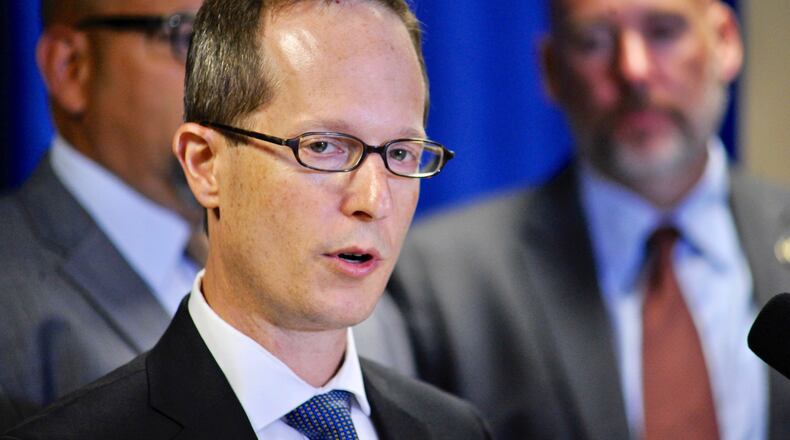The four were each charged with one count of “conspiring to illegally distribute controlled substances,” which is punishable by up to 20 years in prison, according to the U.S. Department of Justice.
FIRST REPORT: Springboro drug distributor, executives charged in federal court
Miami-Luken is no longer in operation and has since sold its assets, though it is still a registered corporation.
“The point of bringing this indictment now, instead of just letting it go, even though this company is not right now distributing pills, is because the interest of justice demands holding criminally responsible anyone and everyone — no matter where was there role in the distribution process — who is culpable,” U.S. Attorney Benjamin Glassman said.
Glassman said the charges were brought after a lengthy investigation.
The people charged include:
• Anthony Rattini, former Miami-Luken president, now living in Colorado Springs, Colorado;
• James Barclay, former Miami-Luken compliance officer, from Springboro;
• Devonna Miller-West, a pharmacist who owned and operated Westside Pharmacy in Oceana, W.V.;
• Samuel “Randy” Ballengee, a pharmacist who owned and operated Tug Valley Pharmacy in Williamson, W.V.
MORE: Did drug distributors contribute to opioid crisis? Yes, says local exec.
There is an outstanding arrest warrant for Barclay as of Thursday afternoon. The others were arrested Thursday morning by teams of federal agents.
Richard Blake, an attorney who represents Miami-Luken, said Thursday afternoon that they were still reviewing the charges.
“I haven’t had an opportunity to review the charges in detail,” he said.
Distributors such as Miami-Luken are companies that buy wholesale pharmaceuticals from manufacturers and then distribute them to businesses such as pharmacies and hospitals.
Several distributors have been accused in recent years of fueling the opioid crisis by failing to let authorities know about suspiciously large orders, which the companies have a legal duty to flag in order to maintain their license.
Previously, distributors have pointed out that they didn’t market opioids, write prescriptions or otherwise create demand. Instead, they were middlemen who filled others’ orders for the painkillers.
LOCAL: Rise and fall of Miami-Luken: Local firm blamed for opioid shipments
From 2008 to 2015, Miami-Luken generated more than $173 million in sales per year with more than 70 percent of the profits from wholesale distribution, according to DOJ records. The company supplied pharmaceuticals to more than 200 pharmacies in Ohio, West Virginia, Indiana and Tennessee.
The DOJ is claiming that Rattini, Barclay and Miami-Luken sought to enrich themselves by distributing millions of painkillers to doctors and pharmacies in rural Appalachia, where the opioid epidemic was at its peak.
Glassman said the purpose of the conspiracy between the pharmacists and Miami-Luken was to facilitate the pain killers being diverted for illicit use, to distribute large amounts of opioids to “known pill mills” and to profit from the unlawful distribution of the painkillers.
In May 2011, Glassman said Miami-Luken had set an internal threshold limit of 6,000 dosage units of oxycodone per month to Miller-Wests’ pharmacy and had internal records indicating a need that purchases from that pharmacy should be monitored.
“And yet that same month, they sent more than 10 times the threshold limit to that pharmacy,” he said.
Ballengee’s pharmacy allegedly received more than 120,000 painkiller pills from Miami-Luken in one month and more than 6 million hydrocodone pills between 2008 and 2014.
RELATED: Local people share their addiction recovery stories
Miami-Luken also allegedly provided another 2.2 million pills from 2012 to 2014 to a pharmacy that had been cut off from other wholesalers. Between 2008 and 2011, it allegedly distributed 3.7 million hydrocodone pills to a pharmacy in Kermit, West Virginia, a town of 400 people.
Miami-Luken was under scrutiny well before the federal charge was announced Thursday.
In May 2018, a Congressional committee investigating distributors called in several distributor executives including Miami-Luken chairman Joseph Mastandrea. Mastandrea answered “yes” when asked at the hearing if he thought distributors’ actions contributed to the opioid crisis. Prior to 2013, the company made “rudimentary efforts” to monitor suspicious orders and decisions on what constituted a suspicious order were made based on “one’s feeling,” Mastandrea said.
At the time, Mastandrea pointed some blame toward management that had already left the company.
“How in God’s name we participated in supplying this individual product when, in hindsight, clearly this was drug diversion. A picture of this pharmacy would be next to the definition in the dictionary. No one was paying attention. It’s an abomination,” Mastandrea had said, in reference to one of the over-supplied pharmacies.
During the years of suspicious shipments, the company was led by Rattini, who became president and CEO in 2008 and was removed amid DEA inquiries. Mastandrea told a Congressional committee that “it was apparent to us that we needed someone more capable in that position” and he was replaced by the board by new president and CEO Michael Faul.
The Post reported that a senior pharmaceutical buyer told investigators in 2015 that she eventually “stopped talking to (Rattini) about her concerns because he wasn’t doing anything about it. It was as if it was falling on deaf ears. Tony never stopped an order.”
This is the second U.S. distributor to be criminally charged in relation to the opioid crisis.
Mostly driven by opiates, U.S. overdose deaths more than tripled from 1999 to 2015 from 16,849 to 52,404, and increased by 11.4 percent in the past year alone to reach the highest level ever recorded.
This April, the DOJ brought its first ever felony criminal charge against a distributor and its executives when it announced charges against Rochester Drug Co-Operative, based in New York, as well as its former CEO and former chief compliance officer.
Unmatched coverage
The Dayton Daily News has covered the actions of Miami-Luken for more than two years. Count on us to continue our in-depth coverage on this case and the opioid crisis that has greatly impacted this region.
About the Author
